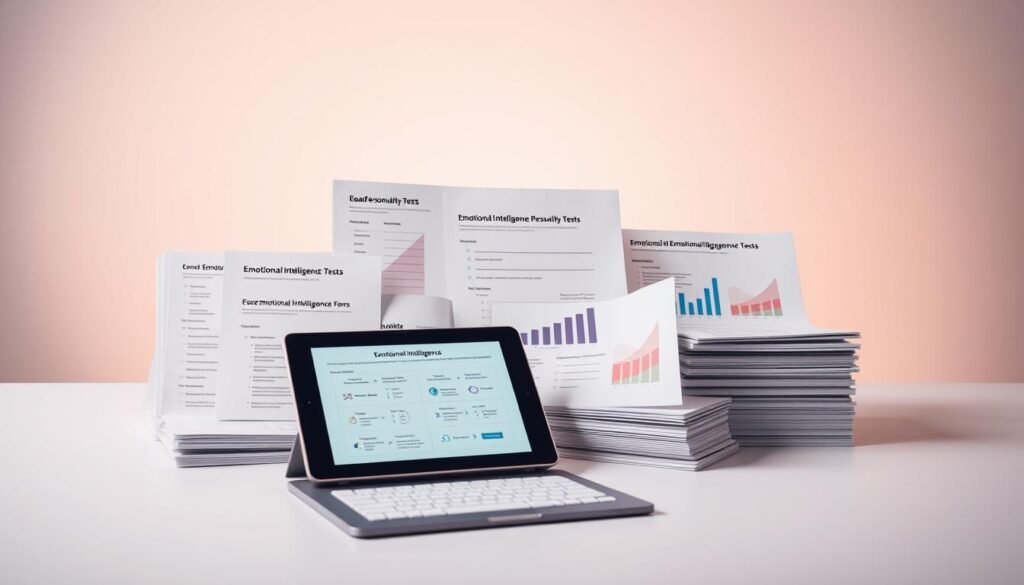Emotional intelligence (EQ) is key to handling life’s ups and downs. Did you know 95% of people think they’re very self-aware? But only 10-15% really show it in tests1? This shows a big truth: EQ is more than just knowing yourself. It’s about controlling your feelings, building trust, and leading others, all important for success and happiness1
Key Takeaways
- Most people overestimate their self-awareness; only a small fraction prove it through testing1.
- Leaders like CEOs often struggle with self-awareness due to overconfidence1.
- High EQ helps women in sales overcome stereotypes like being “too emotional” while building client trust12.
- Reading books with complex characters boosts empathy, a core EQ skill1.
- Organizations thrive when they celebrate employees who use EQ to lead and collaborate1.
What is Emotional Intelligence?
Emotional intelligence (EI) is the skill to understand and manage emotions in yourself and others. It’s more than just feeling; it’s a key to success. Studies show EI can make up to 58% of job performance, beating technical skills in many jobs3
Definition and Key Concepts
Emotional intelligence has four main parts: self-awareness, emotional regulation, social awareness, and managing relationships. Knowing your emotions and how they shape your actions is self-awareness. Emotional regulation, like controlling impulses, reduces stress and enhances decision-making3. Skills like active listening strengthen relationships.
These abilities can grow with practice, mindfulness, and feedback. They’re not set in stone.
Historical Background
Psychologists Peter Salovey and John Mayer coined EI in the 1990s. Later, Daniel Goleman made it famous in the workplace, linking it to leadership success. Today, 90% of top performers have high EI, showing its impact3. Companies now value EI as much as technical skills in hiring4.
Knowing EI’s history shows why it’s crucial in today’s careers and everyday life.
The Importance of Emotional Intelligence
Emotional intelligence is key to building strong connections and achieving success. It’s what sets top performers apart, making up 90% of the difference5. This skill also boosts financial success by 85% through better people skills5. It turns everyday interactions into meaningful experiences, whether at home or work.
In Personal Relationships
Emotional intelligence makes relationships stronger through listening and empathy. People with high EQ handle conflicts calmly and build trust, essential for relationship management6. These skills help create lasting bonds by promoting mutual understanding.
When we communicate openly, misunderstandings disappear, and trust grows deeper6. Empathy helps families and couples face challenges together, preventing small issues from becoming big problems.
In the Workplace
Employers now value emotional intelligence more than technical skills. 71% of companies look for EI when hiring5. Leaders with empathy perform 40% better in coaching and decision-making5.
Teams with emotionally intelligent members have less conflict, saving time on gossip or stress. Companies like Google and Microsoft train managers in EI to boost collaboration and innovation. Employees who manage their emotions well reduce tension, increasing job satisfaction by 72%5.
How Emotional Intelligence Affects Decision-Making
Decisions are often more than just logic. Emotional intelligence helps leaders separate emotions from facts. This turns instincts into informed choices. Over 60% of CEOs face major crises, yet those with high EQ use self-awareness to avoid impulsive reactions7. Leaders who recognize their biases make 40% better decisions using structured frameworks8.
Emotional Awareness in Decision-Making
Self-awareness starts with knowing how emotions influence judgment. For example, 70% of professionals admit emotions cloud critical choices8. Here are some common pitfalls:
| Issue | Prevalence | Source |
|---|---|---|
| Emotional overwhelm | 70% | 8 |
| Perfectionism delays | 75% | 8 |
| Emotional outbursts | 50% loyalty loss | 8 |
The Role of Empathy
Empathy transforms decisions by valuing others’ perspectives. Companies with empathetic cultures cut turnover by reducing fear of conflict7. When leaders practice empathy, teams collaborate better—80% of employees feel safer sharing ideas in such environments9. This builds trust, turning diverse viewpoints into smarter outcomes.
For instance, balancing empathy with data cuts bias. A structured approach improves choices by 40%—proving EQ isn’t about ignoring feelings, but managing them strategically8.
Components of Emotional Intelligence
Emotional intelligence is built on three main parts. These parts help us build better relationships, make smarter choices, and have healthier interactions. Let’s dive into each one.
Self-Awareness
Self-awareness is knowing your feelings and how they impact others. It begins with being honest with yourself about your emotions and actions. For instance, understanding what makes you angry in meetings can help you react differently. This skill grows by journaling or getting feedback from others. Studies show it boosts personal growth and empathy10.
Emotional Regulation
Emotional regulation is about controlling your impulses and staying calm when things get tough. It’s not about hiding your feelings, but choosing how to respond wisely. Leaders who manage stress well earn people’s trust. Training shows this skill reduces stress and enhances problem-solving11.
Social Skills
Social skills turn emotional awareness into action. They include listening well, solving conflicts, and working together. People with strong social skills make better managers and teams work better together. Research shows they lead to better teamwork and job satisfaction11.
| Component | Definition | Key Impact |
|---|---|---|
| Self-Awareness | Understanding personal emotions and their effects | Stronger decision-making10 |
| Emotional Regulation | Managing reactions to stay focused | Improved stress handling11 |
| Social Skills | Effective communication and empathy in groups | Enhanced teamwork11 |
Benefits of Developing Emotional Intelligence
Developing emotional intelligence brings many benefits in both personal and professional life. It improves social skills and relationship management. This leads to better communication and stronger teamwork.
For example, workplaces with emotionally intelligent leaders see a 40% increase in employee inspiration. This is compared to workplaces with low EI leaders12. Such environments also reduce workplace stress, cutting burnout by 25%12 and boosting creativity13.
Enhanced Communication Skills
Effective communication starts with recognizing emotions in oneself and others. Teams with high EI see a 30% rise in productivity13. Employees share ideas openly and listen well.
Leaders with emotional intelligence are 70% better at spotting mental health risks12. This creates supportive work environments. Better communication also increases customer satisfaction by 35%12. Employees handle interactions with empathy and clarity.
Better Conflict Resolution
Handling conflicts with emotional intelligence makes them less damaging. Companies with EI-trained staff report 25% fewer disputes12. They also see 40% higher employee retention12.
Teams using EI strategies solve issues faster. This keeps trust and collaboration strong. Over 70% of workers agree EI improves decision-making13. This ensures solutions benefit everyone involved.
| Benefit | Impact | Source |
|---|---|---|
| Communication | 30% productivity rise | 13 |
| Conflict Resolution | 25% fewer workplace disputes | 12 |
| Leadership | 70% better mental health insights | 12 |
Investing in emotional intelligence changes how teams work together. These stats show how social skills and relationship management boost morale and success. Small steps today can lead to big changes tomorrow.
Assessing Your Emotional Intelligence
Getting to know your EQ begins with looking inward. Self-assessment tools like journals or quick quizzes can show your strengths and where you need to grow. These tools help with self-awareness, a key step in boosting your emotional smarts14. But, they might not catch everything.
That’s where formal tests come in. They offer a deeper look at your emotional skills.

Self-Assessment Tools
Free online tests, like the 20-question EQ test14, give quick insights. Simple tasks like tracking your emotions daily can also help. But, these tools can’t match the depth of professional tests14.
Formal Assessment Methods
Tools like the EQ-i (133 questions) and MSCEIT (141 questions) give detailed feedback15. A 360-degree EQ assessment, used by over 2 million people, shows how others see your emotional skills15. Companies like Optus saw a 16% boost in leadership after using these tools15.
| Tool | Time | Questions | Key Insight |
|---|---|---|---|
| EQ-i (Bar-On) | ~45 mins | 133 | Measures 15 EI skills14 |
| MSCEIT | 45 mins | 141 | Focuses on emotional problem-solving15 |
| 360 EQ | N/A | Peer feedback | Reveals blind spots15 |
Pick assessments that fit your goals. Whether it’s free journals or paid tests, aim for progress, not perfection. Even top performers can get better. Start with curiosity, not criticism.
Emotional Intelligence vs. IQ
Emotional intelligence (EQ) and IQ are two different but connected parts of human ability. IQ tests measure skills like logic and problem-solving16. On the other hand, EQ looks at abilities like empathy and self-control that are key for social and emotional success17.
Both are important, but they play different roles in everyday life.
Understanding the Differences
IQ tests, like the Wechsler Adult Intelligence Scale, check verbal and math skills16. EQ tests, such as the MSCEIT, examine how well someone understands and manages emotions16. For instance, a high IQ might help solve tough math problems. But EQ is crucial for handling team issues or dealing with clients.
Studies show that EQ skills like confidence and managing stress can really improve job performance17.
Complementing Each Other
Today, employers value EQ traits like resilience and teamwork as much as analytical skills17. A leader with both high IQ and EQ can build strong, productive teams17. This combination makes professionals who can adapt to new challenges and work well with others.
| Aspect | Emotional Intelligence (EQ) | IQ |
|---|---|---|
| Core Skills | Empathy, self-awareness | Logical reasoning, pattern recognition |
| Measures | MSCEIT, situational judgment tests | Stanford-Binet, WAIS |
| Development | Trainable through practice16 | Stable after early adulthood |
Strategies for Building Emotional Intelligence
Building emotional intelligence begins with small, consistent steps. Start by checking in with your feelings every day. Ask yourself: What am I feeling now? How does this impact my choices?
This simple habit boosts self-awareness, the first step to better emotional regulation18.
Mindfulness Practices
Try mindfulness exercises like deep breathing for 5 minutes a day. These breaks help you pause between emotions and reactions. This can reduce impulsive actions.
Research shows these practices can increase emotional intelligence by 20%18. Harvard studies found teams with low self-awareness make poorer decisions. Even brief mindfulness sessions can improve focus and calmness19.
Journaling and Reflection
Write down three emotions you felt today and why. Journaling helps track patterns and identify triggers. Ask: What situations caused frustration? How did I react?
Over time, this builds clarity. Regular reflection can enhance emotional awareness by 15%18. Pair entries with solutions, like pausing before responding to conflict.
Begin with one strategy a week. Progress comes from practice, not perfection. Every time you pause to name your feelings, you’re taking a step toward better emotional control and connection with others.
Emotional Intelligence in Leadership
Leadership that uses emotional intelligence helps teams do more than just technical skills. In every field, the top performers have one thing in common: 90% of them have high emotional intelligence20. This skill doesn’t just make people happier—it also sparks new ideas and helps make better decisions, with EI leaders making the right choice 58% of the time20
Why EI Redefines Leadership
Good leadership is all about relationship management. Leaders with high EI make their teams feel valued, leading to a 30% jump in performance21. Traits like self-awareness and empathy help solve problems and keep teams focused on goals. For example, companies that focus on EI in hiring see a 20% increase in employee engagement21.
Real-World Success Stories
Google’s Project Aristotle showed that EI, like active listening, can make teams 40% more cohesive20. Another story: A Fortune 500 company trained managers in emotional awareness, cutting turnover by 35% in just a year. These leaders didn’t just manage tasks—they built trust, a key part of relationship management.
| Statistic | Impact |
|---|---|
| Leaders EI improves team performance by 30%21 | Higher innovation and productivity |
| 58% better decision-making under stress20 | Reduced workplace conflicts |
| 20% rise in employee engagement21 | Stronger organizational loyalty |
Emotional Intelligence in Education
Emotional intelligence is changing classrooms across the country. Now, schools focus on teaching social skills and empathy, alongside academics. Programs like Yale’s RULER method help students learn self-awareness and teamwork, leading to better success22.
Teaching EI in Schools
Teachers use role-playing and group talks to build empathy and teamwork. Over 5,000 schools use Marc Brackett’s RULER framework. This teaches students to recognize and solve conflicts. Schools see fewer behavioral problems after starting these programs23.
Benefits for Students
Students learning emotional intelligence also see better grades and attendance. A study found 75% of schools with EI programs report these improvements. These skills are crucial for future jobs, where social skills are as important as grades22.
Empathy training cuts bullying by 30% in pilot programs. This shows empathy helps students understand different views. Empathy training makes classrooms better places22.
These programs also help teachers. Schools with EI training see less burnout. This creates safer, happier learning environments. When kids manage their emotions, classrooms flourish23.
The Future of Emotional Intelligence
Emotional intelligence (EQ) is becoming key as tech changes work and society. New studies and tools are changing how we learn EQ. They show its value in a world with AI.
Trends in Emotional Intelligence Research
Scientists use brain scans to study EQ traits like empathy24. Google’s “Search Inside Yourself” combines mindfulness and EQ training. It shows real benefits for leaders24.
This shift shows a move towards EQ based on science.
EI in a Technological World
AI tools can now read facial expressions to teach emotional recognition25. Virtual reality simulates stressful situations for EQ practice25. The World Economic Forum sees EQ as a key skill by 203024.
But, 70% doubt companies’ AI ethics, showing EQ’s importance in tech decisions25.
| Technological Tool | Application | Impact |
|---|---|---|
| AI feedback systems | Personalized EQ coaching | Enhances self-awareness25 |
| VR simulations | Conflict-resolution training | Builds empathy in teams24 |
By 2025, 97 million jobs will need EQ and tech skills25. Automation is growing, but EQ is uniquely human. It helps us deal with digital and social challenges, keeping us connected in a wired world.
Resources for Further Exploration
Expand your knowledge of emotional intelligence with helpful resources. Begin with Daniel Goleman’s Emotional Intelligence, which shows how EQ impacts success and relationships26. Learn about the RULER method, a proven approach to recognizing and managing emotions, enhancing self-awareness and social skills26.
Books and Articles
For a structured learning path, check out Emotional Intelligence 2.0 by Travis Bradberry and Jean Greaves. It provides practical advice for personal and professional growth. Studies by Salovey and Mayer highlight EQ’s role in attention and memory27. Social and Personality Psychology Compass shares how empathy and self-awareness help solve conflicts in schools27.
Workshops and Online Courses
Enroll in RULER’s certified programs to learn the five RULER skills. These skills are essential for emotional literacy26. Coursera offers courses on mindfulness and EQ, showing 75% of journalers see emotional improvement with daily practice28. Look for workshops that use the mood meter tool, a visual aid for emotion labeling27.
TED Talks provide insights on self-awareness and empathy, with 90% of listeners gaining clearer views of their biases28. Consistent practice, aiming for 21–28 days, is key to lasting growth26. Use these resources to develop EQ, turning awareness into practical skills for all areas of life.
FAQ
What is emotional intelligence (EQ)?
How does emotional intelligence differ from IQ?
Why is emotional intelligence important in personal relationships?
How does emotional intelligence contribute to workplace success?
What role does empathy play in emotional intelligence?
How can I develop greater self-awareness?
What are the benefits of emotional intelligence in conflict resolution?
How can I assess my emotional intelligence?
What mindfulness practices can enhance emotional intelligence?
Why is emotional intelligence essential for leaders?
How is emotional intelligence being integrated into education?
What are some emerging trends in the field of emotional intelligence?
Source Links
- How to Improve Your Emotional Intelligence – Professional & Executive Development | Harvard DCE – https://professional.dce.harvard.edu/blog/how-to-improve-your-emotional-intelligence/
- How to Unlock the Power of Emotional Intelligence in Your Career – https://www.womeninsaleseverywhere.com/blog/how-to-unlock-the-power-of-emotional-intelligence-in-your-career
- Improving Emotional Intelligence (EQ): Expert Guide – https://www.helpguide.org/mental-health/wellbeing/emotional-intelligence-eq
- What is emotional intelligence and how does it apply to the workplace? | Mental Health America – https://mhanational.org/what-emotional-intelligence-and-how-does-it-apply-workplace
- Emotional Intelligence in Leadership: Why It’s Important – https://online.hbs.edu/blog/post/emotional-intelligence-in-leadership
- Why Is Emotional Intelligence Important? – https://www.forbes.com/councils/forbescoachescouncil/2022/12/30/why-is-emotional-intelligence-important/
- EQ and Decision-Making in Leadership – Kingsley Gate – https://www.kingsleygate.com/insights/blogs/attributes-emotional-intelligence-decision-making/
- Why Decision Making is an Emotional Intelligence Skill : Lisa D. Foster, Leadership Coaching & Training – https://lisadfostercoach.com/2022/09/28/why-decision-making-is-an-emotional-intelligence-skill/
- The Power of Emotional Intelligence in Decision-Making – https://www.linkedin.com/pulse/power-emotional-intelligence-decision-making-tfqdc
- 5 Key Components of Emotional Intelligence – https://www.verywellmind.com/components-of-emotional-intelligence-2795438
- Emotional intelligence: Components, importance, and examples – https://www.medicalnewstoday.com/articles/components-of-emotional-intelligence
- 15 Powerful Benefits of Emotional Intelligence Training | Continu – https://www.continu.com/blog/15-benefits-of-emotional-intelligence-training
- The Benefits of Emotional Intelligence in the Workplace – Ledger – https://campuspress.yale.edu/ledger/the-benefits-of-emotional-intelligence-in-the-workplace/
- Emotional Intelligence Test / Quiz – https://www.psychologytoday.com/us/tests/personality/emotional-intelligence-test
- 4 of the best tools to measure and assess Emotional Intelligence – https://www.rochemartin.com/blog/best-tools-emotional-intelligence
- EQ Versus IQ: What Are They and Which Is More Important? – https://www.betterup.com/blog/eq-vs-iq
- IQ vs EQ: Why Emotional Intelligence Matters More Than You Think – https://www.simplypsychology.org/iq-vs-eq.html
- Ten Strategies for Building Emotional Intelligence and Preventing Burnout – https://www.aafp.org/pubs/fpm/issues/2018/0100/p11.html
- How to Develop Emotional Intelligence Skills | HBS Online – https://online.hbs.edu/blog/post/emotional-intelligence-skills
- Emotional Intelligence in Leadership: Your Key to Success – https://nccusa.edu/blog/the-role-of-emotional-intelligence-in-leadership/
- Why Emotional Intelligence Is Crucial For Effective Leadership – https://www.forbes.com/councils/forbesbusinesscouncil/2023/07/25/why-emotional-intelligence-is-crucial-for-effective-leadership/
- The Power of Emotional Intelligence in Modern Education – https://www.salzburgglobal.org/news/topics/article/the-power-of-emotional-intelligence-in-modern-education
- Why Emotional Intelligence Matters for Educators – https://www.gse.harvard.edu/ideas/edcast/24/03/why-emotional-intelligence-matters-educators
- Empathy & Emotional Intelligence Are The Future Of Leadership – https://www.forbes.com/sites/qhamirani/2024/07/18/empathy–emotional-intelligence-are-the-future-of-leadership/
- The Future Of Your Job Hinges On Emotional Intelligence And Curiosity – https://www.forbes.com/sites/dianehamilton/2024/12/16/the-future-of-your-job-hinges-on-emotional-intelligence-and-curiosity/
- Emotional Intelligence Toolkit – HelpGuide.org – https://www.helpguide.org/mental-health/wellbeing/emotional-intelligence-toolkit
- Teaching Emotional Intelligence in Early Childhood – https://www.naeyc.org/resources/pubs/yc/mar2017/teaching-emotional-intelligence
- Self-Awareness Activities for Emotional Intelligence & Personal Growth – https://www.betterup.com/blog/self-awareness-activities








GIPHY App Key not set. Please check settings